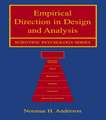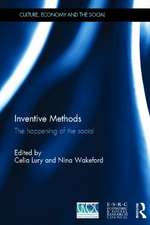Theories of Meaningfulness: Scientific Psychology Series
Autor Louis Narensen Limba Engleză Paperback – 11 sep 2014
The first two chapters of the Theories of Meaningfulness introduce meaningfulness concepts, their place in the history of science, and some of their traditional applications. The idea that meaningfulness will have different, but interrelated uses is then introduced. To provide formal descriptions of these, the author employs a powerful framework that incorporates pure mathematics, provides for qualitative objects and relations, and addresses the relationships between qualitative objects and pure mathematics. The framework is then applied to produce axiomatic theories of meaningfulness, including generalizations and a new foundation for the famous Erlanger Program of mathematics. The meaningfulness concept is further specialized with the introduction of intrinsicness, which deals with meaningful concepts and relations that are lawful and qualitativeness, which is concerned with qualitative concepts. The concept of empiricalness is then introduced to distinguish it from meaningfulness and qualitativeness.
The failure to distinguish empiricalness from meaningfulness and qualitativeness has produced much confusion in the foundations of science literature and has generated many pseudo-controversies. This book suggests that many of these disappear when empiricalness is intersected with the other concepts to produce "meaningful and empirical relations," "empirical laws," and "qualitative and empirical concepts."
A primary goal of this book is to show that the new theories of meaningfulness and intrinsicness developed in this book are not only descriptive but are also potent. Asserting that they do more than codify already existing concepts the book:
*works out logical relationships between meaningfulness concepts that were previously unrecognized;
*clarifies certain well-known and important debates by providing rich languages with new concepts and technical results (theorems) that yield insights into the debated issues and positions taken on them; and
*provides new techniques and results in substantive scientific areas of inquiry.
This book is about the role of mathematics in science. It will be useful to those concerned with the foundations of science in their respective fields. Various substantive examples from the behavioral sciences are presented.
Din seria Scientific Psychology Series
- 19%
 Preț: 426.84 lei
Preț: 426.84 lei -
 Preț: 314.77 lei
Preț: 314.77 lei -
 Preț: 110.22 lei
Preț: 110.22 lei -
 Preț: 478.71 lei
Preț: 478.71 lei - 25%
 Preț: 501.45 lei
Preț: 501.45 lei -
 Preț: 499.50 lei
Preț: 499.50 lei - 23%
 Preț: 320.36 lei
Preț: 320.36 lei -
 Preț: 493.73 lei
Preț: 493.73 lei -
 Preț: 491.17 lei
Preț: 491.17 lei -
 Preț: 492.20 lei
Preț: 492.20 lei -
 Preț: 482.53 lei
Preț: 482.53 lei -
 Preț: 228.77 lei
Preț: 228.77 lei - 26%
 Preț: 821.13 lei
Preț: 821.13 lei -
 Preț: 436.14 lei
Preț: 436.14 lei -
 Preț: 449.41 lei
Preț: 449.41 lei - 12%
 Preț: 325.34 lei
Preț: 325.34 lei - 12%
 Preț: 325.34 lei
Preț: 325.34 lei -
 Preț: 310.65 lei
Preț: 310.65 lei -
 Preț: 388.64 lei
Preț: 388.64 lei -
 Preț: 440.77 lei
Preț: 440.77 lei - 18%
 Preț: 788.94 lei
Preț: 788.94 lei -
 Preț: 127.59 lei
Preț: 127.59 lei - 26%
 Preț: 848.54 lei
Preț: 848.54 lei
Preț: 489.87 lei
Nou
Puncte Express: 735
Preț estimativ în valută:
93.74€ • 96.70$ • 78.22£
93.74€ • 96.70$ • 78.22£
Carte tipărită la comandă
Livrare economică 26 martie-09 aprilie
Preluare comenzi: 021 569.72.76
Specificații
ISBN-13: 9780415654562
ISBN-10: 0415654564
Pagini: 480
Dimensiuni: 151 x 228 x 30 mm
Greutate: 0.63 kg
Ediția:1
Editura: Taylor & Francis
Colecția Psychology Press
Seria Scientific Psychology Series
Locul publicării:Oxford, United Kingdom
ISBN-10: 0415654564
Pagini: 480
Dimensiuni: 151 x 228 x 30 mm
Greutate: 0.63 kg
Ediția:1
Editura: Taylor & Francis
Colecția Psychology Press
Seria Scientific Psychology Series
Locul publicării:Oxford, United Kingdom
Public țintă
ProfessionalCuprins
Contents: R.D. Luce, Foreword. Introduction and Historical Background. Intuitive Theories of Meaningfulness. Axiomatic Set Theory. Axiomatic Generalizations of the Erlanger Program. Representational Theory of Measurement. Intrinsicness. Qualitativeness. Meaningfulness and the Axiom of Choice.
Recenzii
"...the book represents a formidable contribution to psychology where the discipline is taken to be a science on a par with physics, and hence in line with a historically strong position in psychology but one currently on the wane."
—British Journal of Mathematical and Statistical Psychology
"In my opinion this is one of the most important volumes on the foundations of science to appear during my career, and I venture to guess that it will stimulate much critical discussion both at philosophical and scientific levels."
—R. Duncan Luce
University of California at Irvine
"This monograph may be a milestone of the 21st century because it examines so thoroughly the basis for measurement....The topic is one of the most fundamental in science but often not well understood by scientists themselves. It is a particularly important aspect of psychology and economics."
—Stephen Link
Visiting Scholar, University of California at San Diego
—British Journal of Mathematical and Statistical Psychology
"In my opinion this is one of the most important volumes on the foundations of science to appear during my career, and I venture to guess that it will stimulate much critical discussion both at philosophical and scientific levels."
—R. Duncan Luce
University of California at Irvine
"This monograph may be a milestone of the 21st century because it examines so thoroughly the basis for measurement....The topic is one of the most fundamental in science but often not well understood by scientists themselves. It is a particularly important aspect of psychology and economics."
—Stephen Link
Visiting Scholar, University of California at San Diego
Descriere
This book examines the basis for measurement- how to measure what we measure and the meaning of what we measure. It is expected to appeal to those interested in measurement in the fields of psych, econ, med, edu, soc, & other applied social sciences.










